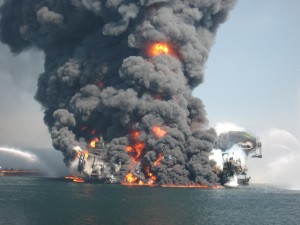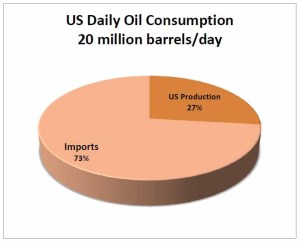Stopping oil exploration is not a realistic option
It’s time for the environmental community to return to reality about the nation’s energy policy.

The Deepwater Horizon accident has put an end to the denial that major oil spills are a thing of the past
Is the ongoing oil leak in the Gulf of Mexico that likely resulted from the failure of the blowout preventer 5000 feet beneath Transocean’s floating drill platform Deepwater Horizon anything short of a huge ecological mess? Definitely not. But should this cause an overreaction to offshore drilling, cancelling all efforts to extract oil from US waters? No, not now.
I know that my fellow ardent environmentalists are saying “Will, how can you support an oil economy given the recent disaster?” to which I say my response is pragmatic. I readily admit that I do wish an idealist environmental response would be the right public policy option. I really do. But it is not.
Today on Capitol Hill numerous elected officials were motivated to chime in on day-one of what is sure to be many more days of Congressional hearings about the Deepwater Horizon accident and subsequent oil leaks.
Senator Lisa Murkowski (R-AK), ranking member of the Energy and Natural Resources Committee, began her statements with two disturbing, and realistic, statements:
-
Production of energy will never be without risk
-
Our nation will need a lot of oil for a long time to come

Significant press coverage and a wide range of interested parties attended the May 11, 2009 afternoon Senate Environment and Public Works hearings - so many so that more than 70 people had to watch the hearing on a large screen in the basement of the Dirksen Senate Office Building
Having the ranking Republican and Alaska native so clearly admit that there will always be dangers with oil drilling means that the oil leaks in the Gulf of Mexico have brought seemingly everyone from their stupor of denial that too long were pervasive energy in policy discussions. It is a sad reality that in the short run (read as for several more years) we will remain largely dependent on an oil economy, and as a result we are still too easily influenced by offshore interests who can affect the price and access to foreign oil. Moves toward a green energy economy are sorely needed, and should be supported by policies and government assistance as a catalyst; however the projects those policy moves would generate won’t show up overnight. Let’s be realists and remember that it was only a few days ago that we finally approved the Cape Wind project. No clear-headed person can call the timeline to green light the Cape Wind wind-turbine project as “fast tracked national policy” that’s for sure.
We should have done something about promoting green energy production and infrastructure 20 years ago but we did not. We can’t change the past. However, we do need to be smart about the implications of that past failure to act.

Even in November 2009 when the US hit a domestic oil production high not seen since 2005, we still consumed 3x more imported oil than domestic oil
Drill baby drill was an insane plan. Insane because it proposed that domestic oil supply was the savior to our economic and foreign policy struggles. It is not a panacea even for those areas. But, I am sad to say, some domestic production is a necessary evil if we want to make sure our economy and foreign relations issues don’t become even more strained. So what should we do in the ocean and energy policy areas following this disaster? We should all be pressing hard for rational decision making. The Obama Administration’s Ocean Policy Task Force interim report released last fall called for “science based decision making,” and at this juncture that still remains a wise plan of action.
We should use engineering and risk assessment to determine what design changes, inspections (by industry itself and by government) and disaster response drills and procedures need to be in place if we are to continue to drill, produce and transport petroleum in locations that could affect the environment if a leak occurs. Potentially affected waters would be defined by anyone that has seen NOAA’s Essential Fish Habitat maps for the U.S. as encompassing essentially everywhere in our coastal and marine waters. In other words there are areas we should be vigilant, and areas we should be extremely vigilant. There is no place mapped by NOAA that shows any place where we can slack-off on our emergency plans and procedures as we plan for when our best engineering still fails.
We should use science to decide which areas can generate significant energy resources, and hold those numbers up against possible economic harms from another disaster. Only when the knee-jerk reactions based on the shock of this horrible oil spill in the Gulf of Mexico subside will we be able to get back to making sound policy decisions for our nation.
The author is a scientist by training and the owner of W.H. Nuckols Consulting, an environmental policy firm.
Halliburton is the only problem, their greed is trying to monopolize the east-coast oil profits and eliminate BP as a contender >>>> http://the2010campaignconspiracy.wordpress.com/ <<<<
jjoshuajj21
May 12, 2010 at 6:04 pm